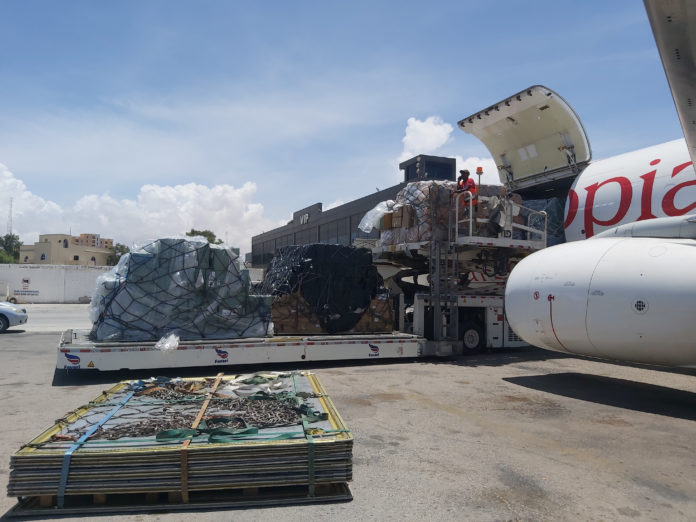The United Nations and Ethiopia have inaugurated the first UN solidarity flight. This service has been set up to help over 120 countries with the most vulnerable health systems in their fight against COVID-19. On this occasion, a humanitarian transport platform was inaugurated at Addis Ababa airport to transport supplies and humanitarian workers particularly across Africa. Another plan is currently being drawn up to facilitate the movement of personnel blocked by the suspension of air traffic.
Due to the Coronavirus pandemic, the majority of air flights have been suspended, as has freight traffic in general. In this context, it is vital to maintain air bridges to transport medical and humanitarian personnel around the world. To achieve this, the logistical power of the WFP was an obvious choice. Indeed, the UN agency in charge of the fight against undernourishment has its own air fleet, which it regularly makes available to the UN system.
Solidarity flights
The first UN "solidarity flight" carrying medical cargo crucial to containing the spread of Covid-19 left Addis Ababa (Ethiopia) on April 14, bound for the Seychelles, Mauritius and Madagascar. According to Elizabeth Byrs, spokeswoman for the World Food Programme (WFP) in Geneva, these flights will also carry vital equipment to five other countries: Djibouti, Sudan, Eritrea, Somalia and Tanzania. WHO Director-General Dr. Tedros Adhanom Ghebreyesus had announced the previous day that these flights were part of a wider effort to send life-saving medical supplies to 95 countries.
The WFP shipment from the World Health Organization (WHO) includes one million protective masks and goggles, gloves, gowns, medical aprons, thermometers and ventilators. This equipment will be sufficient to protect health personnel while treating over 30,000 patients across Africa. Laboratory supplies will support surveillance and screening for COVID-19. A large quantity of medical equipment donated by Ethiopian Prime Minister Abiy Ahmed and the Jack Ma Foundation & Ali Baba Foundation Initiative was also on board.
Airbases and humanitarian depots
In a spirit of solidarity, the government of the United Arab Emirates has generously supported the WHO's regional logistics hub in Dubai, where the goods have been prepared for shipment. In Addis Ababa, a 25-strong team from the WFP's air and logistics department is based at Bole International Airport, managing the 24-hour operation in collaboration with the African Centers for Disease Control and Prevention (Africa CDC) and the African Union. Ethiopian Airlines handles most of the cargo management, scheduling and flight operations.
In addition to bases in the Emirates and Ethiopia, the WFP also has facilities in Accra (Ghana), Panama City (Panama), Kuala Lumpur (Malaysia) and Las Palmas (Spain). New platforms will be deployed in Europe in addition to the existing one in Brindisi (Italy).
Three distribution turntables
Three new centers are currently being transformed into distribution hubs for humanitarian aid dedicated to the fight against COVID-19: Liège (Belgium), Dubai (UAE) and Guangzhou (Canton/China). This network of global logistics hubs will support the entire aid community. They will ensure the delivery of vital medical and humanitarian supplies to developing countries at a time when commercial air transport is at a standstill. Questioned on the subject, Amer Daoudi, Director of the World Food Program's COVID-19 response said that "the window of opportunity to send medical and humanitarian supplies to Africa to stem the pandemic is closing fast." On May1, a cargo ship carrying almost 16 tons of medical freight and personal protective equipment for UNICEF and the International Committee of the Red Cross (ICRC) left Liège, Belgium, bound for Burkina-Faso and Ghana. Part of this shipment will then be transported to the Republic of Congo. The WFP plans to transport the equivalent of 37 Boeing 747 aircraft over the next six weeks from China and Malaysia to 130 countries worldwide. Once the service is fully operational, up to 350 additional cargo and 350 additional passenger flights could fly each month.
New airlift from Geneva
Also as part of the global solidarity movement, the UN is preparing an airlift system to transport personnel twice a week from Geneva, via Rome where the WFP headquarters are located, to African countries in need of aid. The planes would be filled to 50% of their capacity, in order to respect the safety distance recommended by the WHO, and passengers would be equipped with masks.
For the time being, the Swiss and Italian authorities have not yet been approached to facilitate this new airlift of people. According to Amer Daoudi, one of the main difficulties at present is negotiating with countries to allow medical and humanitarian personnel to enter their territory while their borders are closed and populations confined.
Financing
At the end of March, UN Secretary-General Antonio Guterres launched an appeal for $2 billion to enable the global fight against COVID-19. To date, only around $400 million has been raised - just over 19%.
Of this total sum, $350 million is earmarked for the WFP alone, to set up humanitarian aid hubs around the world to facilitate various actions. These include warehousing and distributing essential medical supplies, setting up air links for the transport of goods and personnel, chartering ships for the shipment of cargo, and ensuring the air transport and medical evacuation of medical and humanitarian personnel. To date, only 25% ($91 million) of the total amount has been received.


